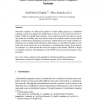Free Online Productivity Tools
i2Speak
i2Symbol
i2OCR
iTex2Img
iWeb2Print
iWeb2Shot
i2Type
iPdf2Split
iPdf2Merge
i2Bopomofo
i2Arabic
i2Style
i2Image
i2PDF
iLatex2Rtf
Sci2ools
COR
2006
2006
Numerical studies on a paradox for non-cooperative static load balancing in distributed computer systems
Numerical examples of a Braess-like paradox in which adding capacity to a distributed computer system may degrade the performance of all users in the system have been reported. Unlike the original Braess paradox, in the models examined, this behavior occurs only in the case of finitely many users and not in the case of infinite number of users and the degree of performance degradation can increase without bound. This study examines numerically some examples around the Braess-like paradox in a distributed computer system. Each node in the system has, at its disposition, a communication means. In the numerical examples, it is observed that the worst-case degree of the paradox (WCDP) is largest in complete symmetry. The dependence of the WCDP on some system parameters is also examined. Key words: Braess paradox, Nash equilibrium, Wardrop equilibrium, performance optimization, numerical examples, distributed computer system, load balancing
Related Content
| Added | 11 Dec 2010 |
| Updated | 11 Dec 2010 |
| Type | Journal |
| Year | 2006 |
| Where | COR |
| Authors | Said Fathy El-Zoghdy, Hisao Kameda, Jie Li |
Comments (0)

